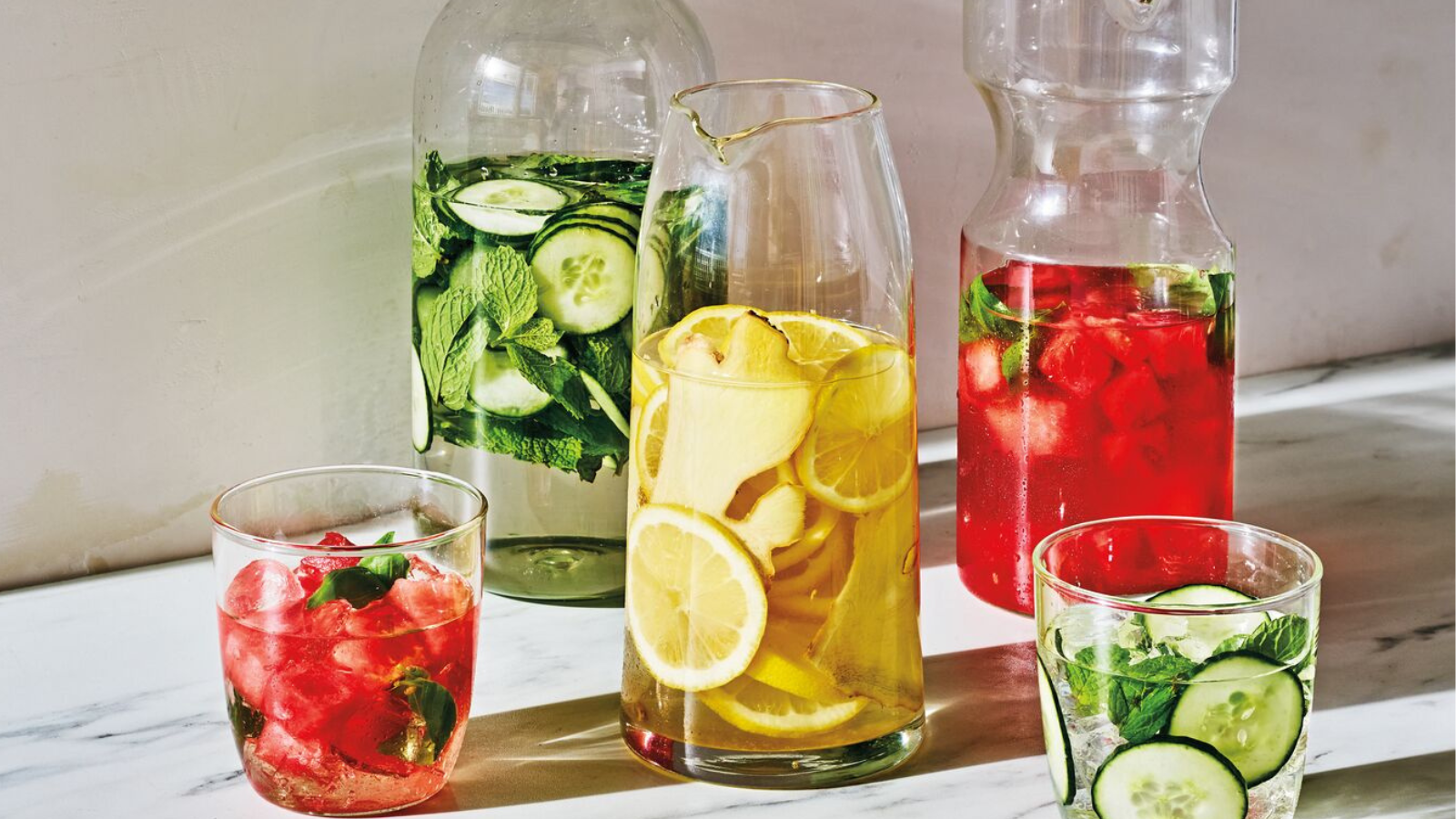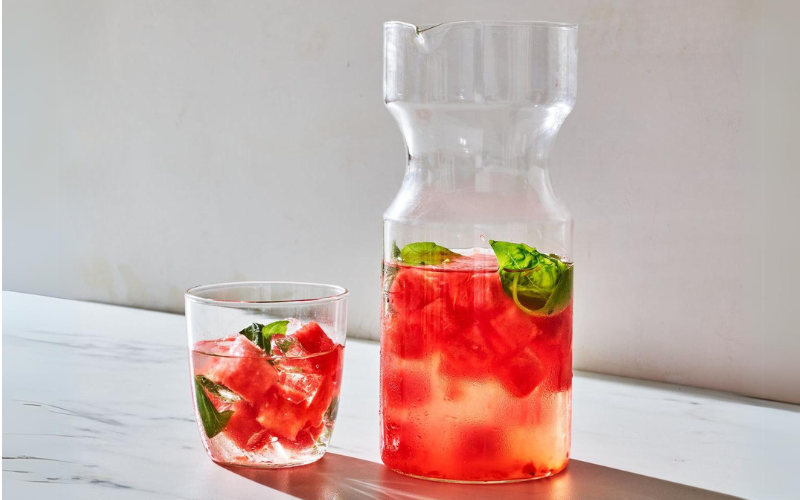How drinking more water may help you lose weight


Water, a seemingly simple substance, generates considerable buzz. Wellness enthusiasts claim that increased consumption leads to significant health benefits: enhanced cognitive function, improved blood circulation, and even greater fat burning. But does this claim about weight loss truly stand up to the science?
Can drinking water help you lose weight?
While there is no direct evidence that drinking water alone leads to weight loss, this clear, calorie-free liquid is essential for nearly every bodily function, including metabolism. After all, 60 per cent of your body is made up of water, highlighting its critical role in maintaining overall health. Proper hydration helps regulate metabolism, aids in digestion, and can even help control appetite by preventing mistaking thirst for hunger. By choosing water to stay hydrated, you support your body's essential processes, which can only help you on your weight health journey.
Does drinking water help decrease appetite?
Research is scant here, but there is anecdotal evidence that water can curb your appetite—possibly because some people mistake hunger for thirst, which is triggered by mild dehydration, according to California-based Dr. Melina Jampolis, M.D. It almost goes without saying, but if you’re always grabbing a snack when what your body actually needs is water, you might find yourself on a path to weight gain instead of loss.
Drinking water before consuming a meal may help you feel full and eat less. One small study of adults with obesity found that those who drank about two cups of water before dining for 12 weeks lost 1.3kg more than those who didn’t have water before eating.
At the very least, proper hydration can promote feelings of satiety, since fluid helps food move through your GI tract during the digestion and absorption process, and helps send the “I’m done” signal to your brain, says Dr. Jampolis.
Does drinking water boost metabolism?
In theory, yes, the chilly temp of a beverage may contribute to a temporary metabolic increase from thermogenesis—or heat production—since your body has to burn calories in order to warm fluid to body temperature. But the effect is more of a slight nudge than a big boost, and it doesn't have much impact on your overall calorie burn or ability to lose weight.
Still, if a handful of ice cubes gets you to drink more water, go for it. “Even if the effect is negligible, it is important to stay hydrated,” says dietitian Elizabeth Huggins, RDN.
Will drinking water help me burn fat?
There are several studies looking at animals that show taking in more water can stimulate lipolysis—the process that burns fat for energy—and some researchers think the effects could be similar in humans. “We’re not certain of the mechanism, but mild dehydration decreases lipolysis, which may be due to hormonal changes,” says Dr. Jampolis.
Another credible theory: Water expands cell volume, which could play a role in fat metabolism. Still, research needs to be done on actual people before Dr. Jampolis will recommend drinking more than the daily recommended amount of water.
Does drinking water increase the effectiveness of exercise?
When you add workouts to your weight-loss plan, you probably want that effort to pay off in more calories burned and more lean muscle mass. Hydration can make that happen.
Your body uses water to dissolve and distribute electrolytes to your muscles. Electrolytes are electrically charged minerals—including sodium, potassium, and magnesium—that trigger the contractions required for movement. Even mild dehydration can lead to an electrolyte imbalance and cramping, notes Dr. Jampolis.
“When muscle cells are dehydrated, the process of building muscle is slowed, making your workouts much less effective,” says Dr. Jampolis.
It’s also important to pay attention to hydration during exercise, because the body loses fluids as it generates heat and cools itself through perspiration. Drinking up helps your body maintain its blood volume, which allows blood vessels at the skin’s surface to expand and regulate body temperature, according to Dr. Jampolis.
“If your body can’t dump excess heat via sweating, you’re setting yourself up for heat exhaustion or worse,” she says. “Adequate hydration can improve your workouts by decreasing fatigue, which can allow you to work out longer and potentially burn more calories.” This means it’s a good idea to hydrate before and throughout your workout—not just when you start to feel thirsty.
Does drinking water reduce bloat?
Water helps everything move through your digestive system, so it’s reasonable to assume drinking more water would help prevent constipation—one of the major causes of bloating. But there really isn’t any solid research to prove it.
Does drinking water affect your motivation?
In addition to muscle cramps, dehydration can lead to several annoying-to-scary symptoms that could reduce your motivation to get moving, including fatigue, dizziness, and confusion. “Any of these symptoms could affect your motivation to exercise, cook at home, and make better food choices,” says Dr. Jampolis.
4 other health benefits of drinking water
Drinking water to lose weight might be a priority for you, but it’s not the only reason to keep sipping. Here are a few more ways water supports your health and wellbeing.
1. Water may help boost your brainpower
Just like the rest of your body, your brain depends on water to work well—it’s actually made of 73 per cent water. Research shows even mild dehydration (as little as two per cent water loss) can impair your performance on tasks that require attention, cognitive functions and physical movement, and immediate memory skills.
2. Water regulates blood pressure
“Water plays a major role in keeping the blood flowing effectively,” says Huggins. “When you’re dehydrated, the plasma/blood cell ratio changes in a way that makes the blood thicker and more viscous. This makes it tougher for blood to flow where it needs to flow, increasing the stress placed on the heart.”
What’s more, when your body’s cells don’t have enough water, your brain pumps out a chemical that constricts the blood vessels. Research shows this can lead to hypertension or high blood pressure and can increase your risk of stroke and heart disease. Staying hydrated can prevent your blood vessels from constricting so blood can flow normally.
3. Water helps remove waste
Drinking water keeps solid waste moving through your digestive tract, and helps it all come out more easily—meaning, you may be less likely to be constipated. But staying hydrated does more than just soften things up, it also helps to restore electrolyte balance and ease bowel discomfort after a bout of too-loose stool or diarrhoea.
Not only that, but your kidneys need water to help filter out toxins and other waste from your bloodstream, which is then flushed out of your body when you urinate.
4. Water aids digestion
Drinking water with meals, snacks, and anytime you’re thirsty helps your body break down and digest food into absorbable nutrients.
So, how much water should you drink?
There’s no magic number, but it’s common to aim for eight glasses of water a day, but you might need more. The amount of water someone needs can vary based on age, biological sex, health, physical activity, tendency to sweat, and more.
A quick way to see if you’re hydrated or not? Look at the colour of your urine. “If it’s dark yellow, you aren’t drinking enough,” says Dr. Jampolis. “Aim for light yellow.”
Add a splash of flavour
If you’re not a huge fan of plain water, experiment with a variety of fresh fruits and herbs to make it extra refreshing. Here are some of our favourite flavour combos to get you started:
- Strawberries, lime and mint
- Orange, fresh ginger and rosemary
- Blueberries, lime and basil
- Pineapple, mint and cucumber
- Watermelon and basil

The bottom line
Along with making healthy food choices and getting regular physical activity, drinking water for weight loss is a great habit to get into.
Switching from beverages that contain calories to water can help you reach and maintain your weight loss goal, and staying hydrated helps your body run more efficiently. “Water is critical in every cellular activity of our body and helps us feel better,” says Huggins. Still, drinking water for weight loss should only be one small part of your wellness plan. It’s important to embrace a more comprehensive approach for total wellbeing, notes Dr. Jampolis.
